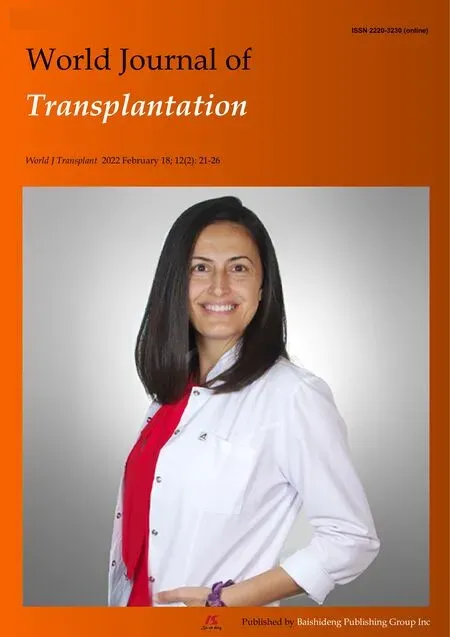Immunosuppressive regimens and outcomes of inflammatory bowel disease patients requiring kidney transplantation
Urvashi Singh, Baljit Singh, Maria Irene Bellini
Urvashi Singh, Department of Surgery, Wythenshawe Hospital, Manchester University Hospitals NHS Foundation Trust, Manchester M23 9LT, United Kingdom
Baljit Singh, Department of Colorectal Surgery, University Hospitals Leicester, Leicester LE1 5WW, United Kingdom
Maria Irene Bellini, Department of Surgical Sciences, Sapienza University, Roma 00161, Italy
Abstract Patients with inflammatory bowel disease (IBD) can develop extra-renal complications and as a result, suffer from end stage renal failure requiring kidney transplantation (KT). A brief review of available literature revealed that IBD patients undergoing KT have shorter overall survival rates compared to their controls. Literature reporting steroid regimens and survival outcomes specific to IBD and post kidney transplant are scarce and these studies have small sample sizes thus making it difficult to draw accurate conclusions. Further research is required in the form of a randomized controlled study to clarify the effect and mechanism of steroid immunosuppression on the prognosis of renal transplant recipients and explore new treatment schemes.
Key Words: Inflammatory bowel disease; Kidney transplantation; Steroids; Immunosuppression; Kidney failure; Ulcerative colitis; Crohn’s disease
TO THE EDITOR
The recent systematic review published by Arefet al[1] titled ‘Does steroid-free immunosuppression improve the outcome in kidney transplant recipients compared to conventional protocols?’ provided thought provoking insight into the impact of steroid-free immunosuppression on the outcome of kidney transplant recipients.Further to the authors conclusions in their paper, we aim to highlight the effect of steroids and steroid free regimens on the outcomes of inflammatory bowel disease(IBD) patients who were kidney transplant receipts.
IBD is comprised of Crohn’s disease (CD) and ulcerative colitis (UC). Patients with IBD can develop extra-intestinal manifestations. These include peripheral arthritis, oral aphthous ulcers, erythema nodosum, episcleritis, pyoderma gangrenosum, primary sclerosing cholangitis and uveitis[2]. Patients with IBD can develop renal manifestations of the disease, including nephrolithiasis, glomerulonephritis, tubulointerstitial nephritis, and secondary amyloidosis[3]. A study reported that the incidence of end stage renal disease (ESRD) in patients with CD was 5 times higher than cross matched controls[3]. Kidney injury can also result from dehydration, long term malnutrition and side effects of IBD medical therapy. These can all contribute to chronic kidney disease and eventually ESRD warranting kidney dialysis and transplantation[3].
Studies reporting IBD patients requiring kidney transplantation (KT) are scarce.However, existing literature discussing IBD, and post KT outcomes reports similar survival rates for IBD patients post transplantation. In a recent detailed study, in which 12 IBD patients (7 CD patients and 5 UC patients) underwent KT due to immunoglobulin A (IgA) nephropathy and polycystic kidney disease, the estimated survival of IBD patients was reported to be 80.8%vs96.8% in patients without IBD (P= 0.001)[4]. Treatment with infliximab or a dalimumab resulted in stable disease or improvement in kidney transplant patients affected by mild to moderate IBD. Eleven out of 12 patients were on maintenance immunosuppression with low dose corticosteroids (5 mg prednisolone daily), calcineurin inhibitors (tacrolimus), and antimetabolite (mycophenolic acid in nine and mycophenolate mofetil in two); the twelfth patient was kept on low-dose corticosteroids and tacrolimus only. IBD course remained stable in the whole transplant group, but resulted in an increased risk of mortality and hospitalization, due to a higher infection rate[4].
Data on immunosuppression and steroid regimens specific to IBD and the post-KT period remains poorly reported. In a study, six patients (5 CD patients and 1 UC patient) out of 1537 patients with IBD, underwent KT for kidney failure secondary to amyloidosis, IgA nephropathy, oxalate nephropathy, haemolytic uraemic syndrome,and chronic kidney failure of unknown origin[5]. Five of the six patients received steroid therapy after transplantation, yet specific immunosuppressive regimens are not reported pre and post transplantation. The study discusses the outcomes of IBD patients post liver transplantation together with KT, hence it is not possible to comment on the post KT alone. However, the study does report an 84% survival rate during a total follow up of 103.0 mo and median follow up of 33 mo after solid organ transplantation. One male patient also developed papillary renal cell carcinoma in the transplanted kidney in this study. No graft rejection was reported[5]. In a different prospective cohort study that followed 26 patients with IBD and systemic ascorbic acid(AA) amyloidosis between 1989 and 2010, an 83% survival rate 15 years post transplantation was reported. In this study all patients had renal dysfunction as result of AA amyloidosis[6]. However, only six patients required renal transplantation due to ESRD. Four patients had deceased donor transplants and two patients had liverelated transplants. There were five functioning grafts at census 0.8, 3.2, 4.2, 20.1 and 24.6 years after transplantation. One graft failure was reported at 14.5 years after renal transplantation due to recurrence of amyloidosis and sustained chronic inflammatory activity. The study notes that patients were provided with steroid regimens however does not provide specific details about whether these regimens were supplemented with other immunosuppressants[6]. Specific reporting regarding immunosuppressive regimens is warranted for IBD patients before and after KT.
In conclusion, IBD is an immunomediated disease that is associated with kidney disease and can cause ESRD in patients. From the available literature, it is suggested that patients with IBD that undergo KT have shorter overall survival rates compared to their controls. Reported data is scarce and inconclusive due to the small patient cohort sizes. Further research is required in the form of a randomized controlled study to clarify the effect and mechanism of steroid immunosuppression on the prognosis of renal transplant recipients and explore new treatment schemes.
 World Journal of Transplantation2022年2期
World Journal of Transplantation2022年2期
- World Journal of Transplantation的其它文章
- Assessment of advanced age candidates for liver transplantation warrants more caution
